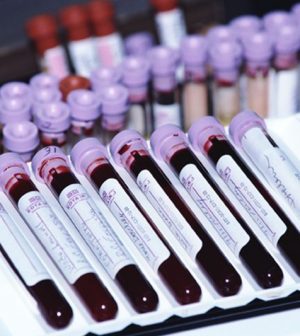- Recognizing the Signs of Hypothyroidism
- 10 Strategies to Overcome Insomnia
- Could Artificial Sweeteners Be Aging the Brain Faster?
- Techniques for Soothing Your Nervous System
- Does the Water in Your House Smell Funny? Here’s Why
- Can a Daily Dose of Apple Cider Vinegar Actually Aid Weight Loss?
- 6 Health Beverages That Can Actually Spike Your Blood Sugar
- Treatment Options for Social Anxiety Disorder
- Understanding the Connection Between Anxiety and Depression
- How Daily Prunes Can Influence Cholesterol and Inflammation
Your Blood Type Might Raise Odds for Certain Health Conditions

Certain blood types may increase a person’s risk of different health problems, a new study suggests.
The research confirms some previous findings and reveals new links between blood types and diseases, according to the authors of the study published April 27 in the journal eLife.
“There is still very little information available about whether people with RhD-positive or RhD-negative blood groups may be at risk of certain diseases, or how many more diseases may be affected by blood type or group,” said first author Torsten Dahlén, a doctoral student at Karolinska Institute in Stockholm.
To help fill that gap, the researchers investigated the link between blood types, RhD status and more than 1,000 diseases. (A person who is RhD positive has a protein called the D antigen on their red blood cells; RhD negative means the protein is absent.)
The analysis of health data from more than 5 million people in Sweden identified 49 diseases linked to blood types, and one associated with the RhD group.
The findings showed that people with type A blood were more likely to have blood clots; those with type O blood were more likely to have a bleeding disorder; and women with type O blood were more likely to develop pregnancy-induced high blood pressure (“hypertension”).
The investigators also found a new link between type B blood and a lower risk of kidney stones, and noted that women who are RhD-positive are more likely to develop pregnancy-induced hypertension.
More research is needed to confirm these findings and to learn more about the links between blood type and disease risks, according to the study authors.
“Our findings highlight new and interesting relationships between conditions such as kidney stones and pregnancy-induced hypertension and blood type or group,” said senior author Gustaf Edgren, associate professor of epidemiology at the Karolinska Institute.
“They lay the groundwork for future studies to identify the mechanisms behind disease development, or for investigating new ways to identify and treat individuals with certain conditions,” Edgren added in a journal news release.
More information
The American Red Cross has more on blood types.
SOURCE: eLife, news release, April 27, 2021
Source: HealthDay
Copyright © 2026 HealthDay. All rights reserved.










